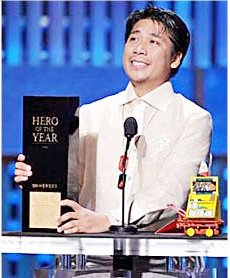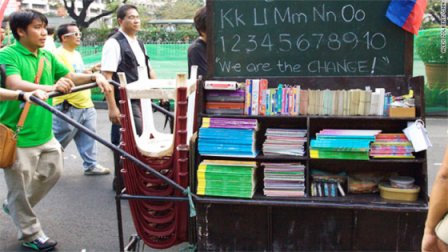
By: Lourdes G. Mon
CNN Heroes, hosted by Anderson Cooper started in 2007. Annually, CNN conducts a world-wide search for the 10 top recipients of the award. The program honors individuals who make extraordinary contributions to humanitarian aid and make a difference in their communities. What is exciting about it is that, all 10 get a prize money of $10,000 each, to promote their project. Among the ten awardees, one is chosen to be the Hero of the Year.
In the history of the awards, the Philippines had only one recipient. It was Efren Peñaflorida in 2009, of Cavite City. He was one of the 10 winners that year, and finally was voted the Hero of the Year. Efren was the Hero of the Year, receiving an of $100,000. He instantly became a household name in the Philippines. Upon his return home, President Gloria Macapagal Arroyo conferred on him the Order of Lakandula in a ceremony at Malacañang Palace. It is one of the highest civilian orders of the Philippines, for leadership, prudence, fortitude, courage and resolve in the service of one’s people.
Efren Peñaflorida was nominated for his initiative, Kariton Klasrum (Pushcart Classroom), promoting an unconventional way of educating the disadvantaged, the marginalized, and street children, who were susceptible to gang recruitments and who engaged in unfavorable vices. When Efren was 16 years old, he and three of his friends formed Dynamic Teen Company (DTC). They went out to the streets with a pushcart filled with children’s books and taught street children how to read and write. Their “school” was held at cemeteries and dump sites. He said, “When we first started pushing carts here in Cavite, it was not accepted. The pushcart is not a symbol of education, it’s a symbol of poverty in the Philippines.”
What has happened to Efren and his project since the award? Today, Efren is a well-sought inspirational speaker, around the Philippines and abroad. However, he makes sure to fulfill the duties and responsibilities of his calling – that of being an educator. He recently spearheaded an open high school program for high school dropouts in Cavite, wherein he serves as the headmaster. “This is what I’m currently busy with, aside from Kariton Klasrum replication. We have assigned volunteers for the replication training in different parts of the Philippines.”
With regular speaking invitations and training locally and abroad, Efren makes sure he fulfills the duties and responsibilities of his calling – that of being an educator. He spearheaded an open high school program for high school dropouts in Cavite, wherein he serves as the headmaster. “This is what I’m currently busy with, aside from Kariton Klasrum replication. We have assigned volunteers for the replication training in different parts of the Philippines.”
Founder Efren continues to be the chairman of TDC. The success of the program inspired other countries, particularly Indonesia, Kenya, and Sri Lanka, replicate and localize the program. TDC focuses on the different needs of those in the remote communities: people with disabilities, indigenous people, and street children, who do not attend formal school for various reasons. TDC encourages these children to go back to school, by supporting them as they continue and complete their formal learning. Efren believes that these children really want to go to school; it’s just that they lack the opportunity to do so.
In 2011, the Philippine Department of Education (DepEd) Efren Peñaflorida pushing his Kariton Klasrum. adopted the Kariton Klasrum idea as part of the Alternative Learning System (ALS) Program and implemented it nationwide. In partnership with DepEd, it has now become easier for the team to bring the children back to school. After a 6-month program with DTC, the children are turned over to the nearest partner DepEd School for them to continue and finish formal schooling.
DTC adopts a four-phase strategy – Kariton Klasrum for grade school children, Learners’ Educational Aid Program (LEAP) for high school students, Support for Tertiary Education Program (STEP) for those who want to enter college, and Formal Admission to Career and Employment (FACE) for those who want to enter the workforce.
With the K-12 reform in place, DTC expanded by starting to implement DepEd programs such as the Open High School and Senior High School. DTC recently opened up Ecodemya, an environment- friendly school, in Halang, Cavite, primarily catering for Senior High School scholars.
Now, to make this story full circle, I would like to mention a brief personal background of Efren Peñaflorida. The son of Efren Peñaflorida Sr., a tricycle driver, and Lucila Geronimo, a housewife, he grew up in an urban slum near a waste dumping ground in Cavite City, playing among piles of garbage and swimming in polluted waters. In high school, he was frequently a victim to bullying by street gang members. Luckily, Harnin Manalaysay, a local evangelist took Efren under his wings. He told Efren that if he succumb to the pressure of the street gangs, he will end up in prison or at the cemetery.
Efren became one of World Vision’s sponsored-children, an ecumenical Christian humanitarian aid, development, and advocacy organization. He completed his high school education through the help of scholarships and financial assistance, and received several class awards and hnoonors. In 2000, he graduated from San Sebastian College-Recoletos de Cavite, with a degree in Computer Technology, receiving highest honors. He pursued a second course at Cavite State University graduating cum laude in 2006 with a degree in Secondary Education.
A true living hero for youngsters, Efren Peñaflorida and his “Kariton Klasrum” are a blessing to the impoverished, and an inspiration to all.


 VIA Times – February 2024 Issue Vital News, Vibrant VIews for Asian Americans in Chicago & Midwest
VIA Times – February 2024 Issue Vital News, Vibrant VIews for Asian Americans in Chicago & Midwest

